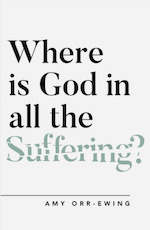A few days ago I walked behind her casket into her funeral service, carrying her baby girl in my arms. I find myself asking: Is there any hope in this seemingly hopeless situation? Is there any comfort for a daughter who will grow up not remembering her mother? Is there a loving God who could pour His love and comfort into our grieving hearts? Is God really there in all our pain and heartache over loss?
Right now I find myself working at home during a government lockdown, in isolation with my family. The death toll from COVID-19 climbs daily. We have all been shocked to discover how vulnerable and helpless we are against a microbial virus that has taken loved ones, closed borders, shops and restaurants, and halted the economy of half the planet. Where is God in the fear, suffering and grief of this global pandemic?
Books on suffering written by academic types rarely connect with people who are actually suffering. I work in Oxford, and I have had the opportunity of studying and teaching throughout my adult working life. In the course of that time, I have found myself drawn to thinking about and reflecting on some of the toughest questions of life. Through all of that, I have come to realise that if Christian faith is worth considering, it needs to be deep enough to cope with our most rigorous human scrutiny and our most heart-rending questions.
Just have faith?
One of the worst things people in religious circles sometimes seem to say to someone suffering is “Don’t ask why”, closely accompanied by “Don’t think about it” or “Just have faith.” These comments are just so unhelpful.
A questioning and thoughtful response to our human experience of suffering can be a really important part of coming to terms with terrible things that have happened to us. But I want to suggest that it can also be a crucial part of exploring the Christian faith. The Bible is full of people’s questions to and about God in the context of human suffering. Questions like Why would you let this happen? and Where are you, God?
My own personal experience has graphically coloured this question of suffering for me. Although I am a writer, a thinker and a teacher, I have spent 14 years of my life living in deprived neighbourhoods—in the inner city. I lived for seven years at a time in two of Britain’s most disadvantaged and dangerous neighbourhoods. As a teenage girl I was physically attacked, but, perhaps more significantly, in my early thirties I lived under the specific threat of violent attack (rape and murder) for two years.
Personal experience inevitably shapes our thoughts about the question of suffering and evil, and we all need to be honest about that. For me this question is profoundly personal; it is not primarily abstract or theoretical. How do we make sense of the suffering in the world around us when it feels like this?
Up close and personal
Wondering why a loving God might allow suffering, or, for that matter, where He is while we suffer, are not questions that any of us can dissect with sterilised instruments in a clean laboratory removed from outside influence or bias or personal pain. Because, even as we ask these questions, we live here—in this world—where brutal, senseless, tragic things happen to people we love. My book Where is God in All The Suffering? is intended to be a reflection from the perspective of Christian faith in the midst of this dark world on why there might be such suffering in this world if God is loving, and how God—if He exists at all—interacts with people who are in pain.
When my university friend died in a freak accident while travelling in South America a year after our graduation, a whole crowd of us in our twenties, just starting our first jobs, gathered at his funeral. I remember one of them saying, “Is pain the price we pay for love?” Grief was, and is, a strange and disconcerting experience. Grief involves fear, sadness, tears, a sense of shock and maybe even a disconnect from the loss. And then, as life goes on, the intense feelings subside only to suddenly and unexpectedly resurface. One moment life is bumbling along, and then suddenly, out of nowhere, a wave of sorrow and sadness hits, crashing over you, threatening to drown you, sucking the very life from your lungs. You realise that the person you have lost is not there and you will never see their face again.
The price of love
A Hebrew poet in Psalm 23 in the Bible powerfully describes this experience as “the valley of the shadow of death”. This shadow is cast most profoundly over those who loved the person who has died most intimately, but it touches all who knew them. So, as my friend asked, Is pain the price of love?
At the funeral of the child of some dear friends, the service began with the thought that this precious newborn baby boy had never known a day without love. The pain and grief of those who loved him most was the cost of that love. He was loved.
For me, love is the starting place for untangling questions of pain and suffering, and especially the question “Where is God in all the suffering?” Love seems to be at the absolute core of why suffering feels like it does. Suffering feels so wrong to us because of our love for another person who is in distress. We instinctively rage against injustice because we feel that people deserve love and dignity. And when I suffer, the question I am struggling with at the deepest level is this: Am I loved? And if I am truly loved, how could this be happening to me?
When we ask these kinds of questions, we are making an assumption: That people have inherent and sacred value by virtue of being human; that I have value because I am human. But can we take for granted that love is a foundational concept from which to ask questions about suffering and God? As we try to wrap our heads around the human experience of suffering and the question of where God is in suffering—is love really that important? Aren’t there other ways of looking at this question that are not grounded in a relational perspective and all that follows from the prospect of the existence of a loving God? Can we even meaningfully say that suffering is wrong, rather than simply unlucky?
Suffering loss is the cost of having deeply loved. The New Testament of the Bible includes a story about Jesus Christ as He stood at the tomb of His close friend Lazarus and mourned for him. The story contains the shortest verse in the Bible: “Jesus wept.” The next verse goes on “Then the Jews said ‘See how he loved him!’”
Jesus experienced what we go through when we lose a person, and it moved Him to tears. The Bible includes stories like this which underline how powerful an experience of grief is and that this is not an experience that God absents Himself from.
Counting life as precious
Jesus Himself went through grief; He Himself experienced loss. His tears caused those watching to conclude that Jesus truly loved His friend—grief and love seem to be inextricably connected. But perhaps we need to ask ourselves why does the death of a loved one hurt so much? And, on top of that, does what I believe about the world, God and life make sense of why loss hurts so much?
Within the Christian story, losing a person hurts this much because a human is inexpressibly, eternally and undeniably precious. One Hebrew poet wrote:
“For you created my innermost being;
You knit me together in my mother’s womb.
I praise you because I am fearfully
and wonderfully made.”
Human beings are glorious, created, precious beings. We are not the product of random processes, indistinguishable in value from slime; we were “formed”, and lovingly “made”. Ecclesiastes speaks of the Bible’s view that human life is not reducible by materialism and that, regardless of our beliefs or worldview, there is something eternal about us:
“He has made everything beautiful in its time.
He has also set eternity in the human heart.”
The first book of the Bible, Genesis, describes how death, separation and sorrow came into the world as a result of human choices made initially in the Garden of Eden and subsequently reinforced by every human who has ever lived. Genesis tells us that the world was made “good” and things have gone wrong. We human beings have used our capacity to choose to bring darkness, sorrow, death, disease and loss into this world.
The end of death
The end of the Bible provides further insight into this question of where God is in our suffering and loss, especially when we’re reeling from the death of someone we love. In Revelation, the last book of the Bible, God makes a promise about the end of time:
“And I heard a loud voice from the throne saying,
‘Look! God’s dwelling-place is now among the people,
and he will dwell with them. They will be his people,
and God himself will be with them and be their God.
He will wipe every tear from their eyes. There will be
no more death or mourning or crying or pain, for the
old order of things has passed away.’ ”
That is an extraordinarily intimate image. Our crying eyes are so sensitive and tender. Many of us cry floods and floods of tears. As the mother of three boys I have often needed to mop up tears on the faces of my children. The promise in Revelation is that just as a loving parent looks into the face of their child and dabs their crying eyes as they comfort them, so God will wipe away our tears—and He will do that for all who turn to Him.
In these closing pages of the Bible there is an acknowledgment of the depth of the pain that people will experience in life, and an offer of eternal comfort and intimate connection with God. As I grieve personally, that promise means a lot to me. It doesn’t just make sense; it also sinks into my heart.

This is an adapted extract from Amy Orr-Ewing’s book Where is God in All The Suffering? This empathetic, easy-to-read and powerful book is good for both unbelievers and believers alike. It will help those hoping to answer one of life’s biggest questions as well as those who are either suffering personally or comforting others.
WIN CHILDREN’S BOOKS!
Submit a personal story on your parenting journey, thoughts or experience and if we use your story, we’ll send you a selection of children’s books! Write to us at [email protected].
How helpful was this article?
Click on a star to rate it!
0 / 5. 0
Be the first to rate this post!
Amy Orr-Ewing
Related posts
Subscribe
Receive personalised articles from experts and wellness inspiration weekly!


